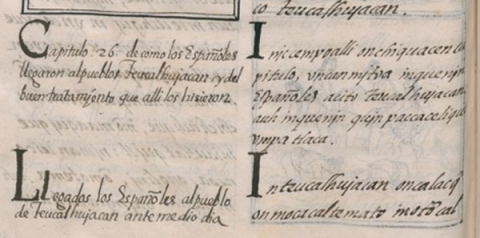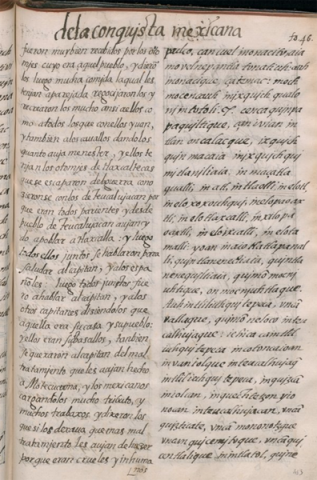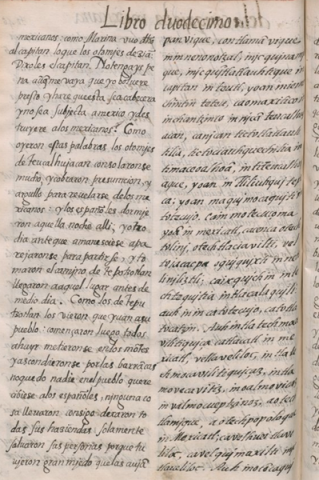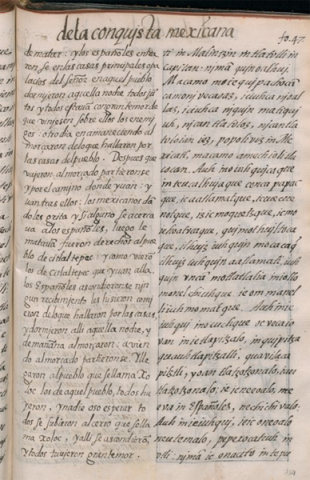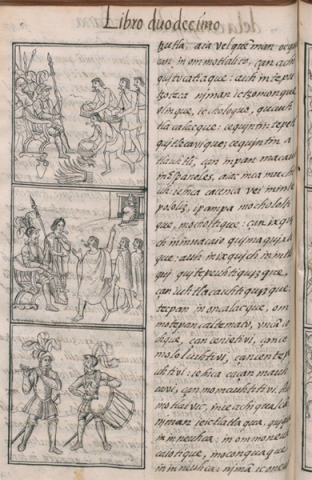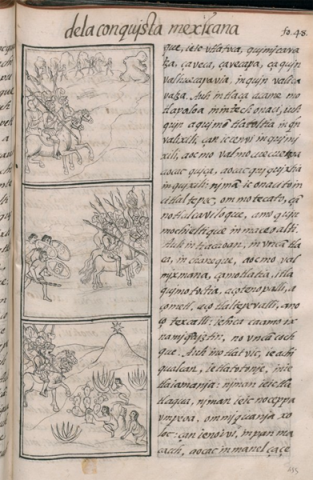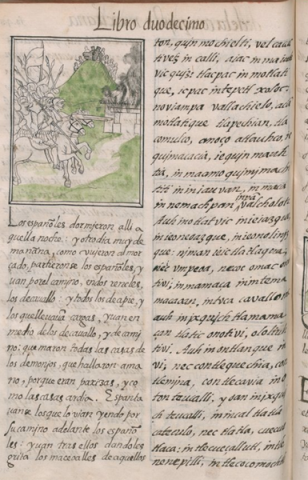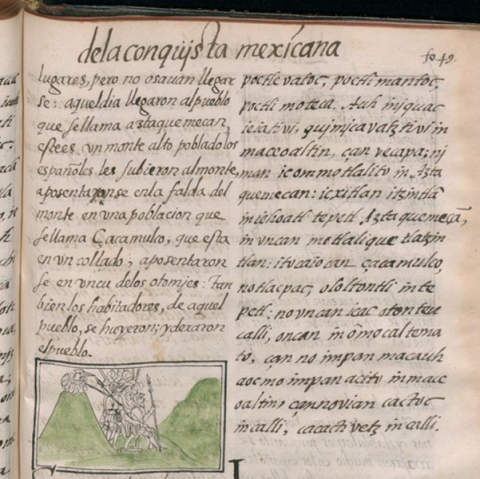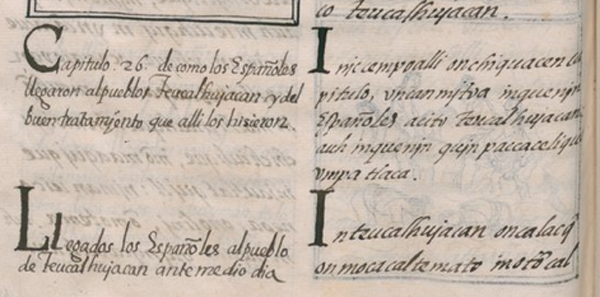 |
[Transcription of the Nahuatl (right-hand column) by James Lockhart:]
[f. 45v., cont.] Inic cempoalli onchiquacencapitulo, vncan mitoa in quenin Españoles acito Teucalhuiacan: auh in queninquinpaccacelique vmpa tlaca.
In teucalhuiacan oncalacq̄ onmocacaltemato in otōcal
|
[Translation of the Nahuatl (right-hand column) by James Lockhart:]
Twenty-sixth chapter, where it is said how the Spaniards reached Teocalhueyacan, and how the people there received them gladly.
When they entered Teocalhueyacan, they went to arrange themselves in various buildings of the Otomi calpolli <temple>;
[Translation of the Spanish (left-hand column) by James Lockhart:]
Chapter Twenty-six, of how the Spaniards reached the settlement of Teocalhueyacan, and the good treatment they received there.
The Spaniards, arriving at the settlement of Teocalhueyacan before midday,
|
[Translation of the Nahuatl into Spanish by Fr. Bernardino de Sahagún; transcription of the Spanish (left-hand column) by James Lockhart:]
[f. 45v., cont.] Capitulo .26. de como los Españoles llegaron al pueblo Teucalhuiacan y del buen tratamiento que alli los hizieron.
Llegados los Españoles al pueblo de Teucalhuiacan ante* mediodia
----------
*ANTE. Normal usage would demand "antes de."
|
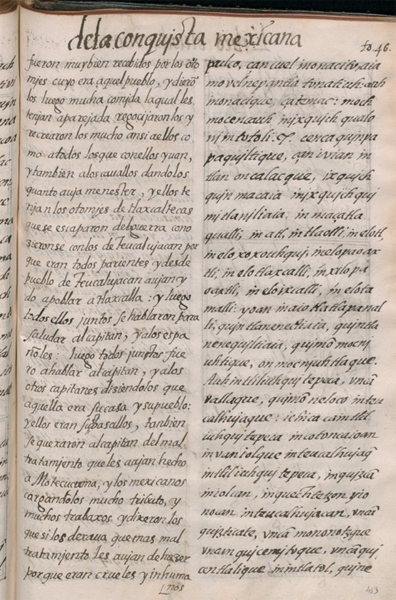 |
[Transcription of the Nahuatl (right-hand column) by James Lockhart:]
[f. 46r.] pulco, çan cuel in onacito, aiamo vel nepantlatonatiuh: auh in onacique, ça temac: moch mocencauh in ixquich qualoni in totoli .&. cenca quinpapaquiltique, çan ivian intlan oncalacque, ixquich quinmacaia in ixquich quimitlaniliaia, in maçatlaqualli, in atl in tlaolli, in elotl, in eloxoxouhqui, in elopaoaxtli, in elotlaxcalli, in xilopaoaxtli, in eloixcalli, in elotamalli: yoan in aiotlatlapanalli, quintlanenectiaia, quintlanenequiltiaia, quimōmocniuhtique, onmocniuhtlaque.
Auh in tliliuhquitepeca, vncā vallaque, quimōneloco in teucalhuiaque: iehica ca in tliliuhquitepeca incotoncaioan invaniolque in teucalhuiaq̄ in tliliuhquitepeca, inquizcā iniolcan, inquechtetzon yionocan in teucalhuiacan, vncā quizticate,
vncā mononotzque vncan quicemitoque, vncā quicentlalique in intlatol, quine
|
[Translation of the Nahuatl (right-hand column) by James Lockhart:]
they got there quickly, before high noon. When [the Spaniards] arrived, all the food—turkeys, etc.—was prepared and at hand. They made [the Spaniards] very happy, joining them peacefully, giving them everything they asked them for: deer fodder, water, shelled maize, fresh ears of maize—raw, cooked, made into tortillas, baked, made into tamales—cooked tender maize, and gourds broken into pieces. They kept offering them various things, they made friends with them, they became friends.
And the people of Tliliuhquitepec came there to mingle with the Teocalhueyacan people, because the people of Tliliuhquitepec had split off from the people of Teocalhueyacan and were their relatives. Teocalhueyacan was the birthplace, the foundation site of the people of Tliliuhquitepec, the place from which they came.
There they consulted together, agreed, stated as one, said jointly,
[Translation of the Spanish (left-hand column) by James Lockhart:]
were very well received by the Otomis to whom that settlement belonged, and then they gave them much food that they had ready for them. They entertained them well, [the Spaniards] as well as all those who went with them, also giving the horses whatever they needed, if they had it.
The Tlaxcalan Otomis who escaped from the battle got to know the people of Teocalhueyacan because they were all relatives, and it was from this settlement of Teocalhueyacan that they had gone to settle Tlaxcala.
Then all of them spoke together about greeting the Captain and the Spaniards, and then they all went together to speak to the Captain and the other captains, telling them that this was their home and their settlement, and they were their vassals. They also complained to the Captain of the bad treatment that Moteucçoma and the Mexica had given them, loading them down with much tribute and great afflictions, and they told them that if they left them they were going to give them more bad treatment, because the
|
[Translation of the Nahuatl into Spanish by Fr. Bernardino de Sahagún; transcription of the Spanish (left-hand column) by James Lockhart:]
[f. 46r.] fueron muy bien recebidos por los otomies cuyo era aquel pueblo, y dierōlos luego mucha comida la qual les tenian aparejada regocijaronlos y recrearonlos mucho ansi a ellos como a todos los que con ellos yuan, y tambien a los cauallos dandolos quanto auia menester, y ellos tenian
los otomies de tlaxcaltecas* que se escaparon de la guerra conozieronse con los de Teucaluiacan porque eran todos parientes y desde** pueblo de Teucaluiacan auian ydo a poblar a Tlaxcalla:
y luego todos ellos juntos se hablaron para saludar al capitan, y a los españoles: luego todos juntos fuero a hablar al capitan, y a los otros capitanes diziendolos que aquella era su casa y su pueblo: y ellos eran sus basallos, tanbien se quexaron al capitan del mal tratamiento que les auian hecho a*** Motecuçoma, y los mexicanos cargandolos mucho tributo, y muchas trabaxos y dixeron los que si los dexaua que mas mal tratamiento les auian de hazer porque eran crueles y inhumanos
|
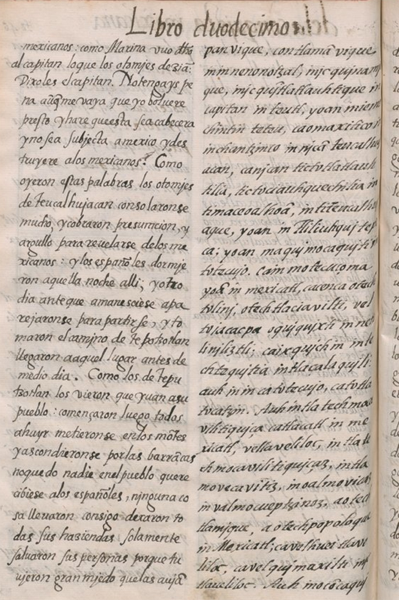 |
[Transcription of the Nahuatl (right-hand column) by James Lockhart:]
[f. 46v.] panvique, contlamāvique in innenonotzal, inic quinamicque, inic qu¯itlatlauhtique in capitan in teutl, yoan in ie mochintin teteu, ca omaxitico in inchantzinco in nicā teucalhuiacan, ca nican tictotlatlauhtilia, tictociauhquechilia in timaceoalhoā, in titeucalhuiaque, yoan in Tliliuhquitepeca; yoanma quimocaquiti in totecuio. Ca in motecuçoma yoā in mexicatl, ca cenca otechtolini, otechtlaciavilti, vel toiacacpa oquiquixti in netoliniliztli;* ca ixquich in in techtequitia in tlacalaquili:** auh inin ca totecuio ca totlatocatzin. Auh intla techmocavilitiquiça catlacatl in mexicatl, vellaveliloc, intla techmocavilitiquiçaz, intlamovecavitiz, in oalmovicaz in valmocueptzinoz, aotechtlamique, aotechpopoloque in Mexicatl: ca vel huei tlaveliloc, ca vel quimaxilti inic tlaueliloc.
Auh in ocōcaqu
----------
*VEL TOIACACPA OQUIQUIXTI IN NETOLINILIZTLI. Such I take to be the thrust of this expression, of which I have seen no other example. It seems to say, more literally, “they have taken affliction [to? from?] our very noses.”
**TLACALAQUILI. Read “tlacalaquilli”; most of the other cases of “-li” for -lli involve some form of the word calli.
|
[Translation of the Nahuatl (right-hand column) by James Lockhart:]
and arranged an agreement to meet with and address the Captain, the god, and all the gods.“They have arrived here in Teocalhueyacan, which is their home. Here we address and greet them, we their subjects, we of Teocalhueyacan and those of Tliliuhquitepec, and may our lord hear. Moteucçoma and the Mexica have greatly afflicted and exhausted us, they have afflicted us in extreme measure. [Moteucçoma] assigns us all this tribute, for he is our lord and ruler. And if [the Spaniards] go and leave us, the Mexica are inhuman, very fierce; if they go and leave us, if it is a long time before they come back and return, will not the Mexica have finished us off and destroyed us? For they are very fierce, exceeding in viciousness.”
And when Marina had reported
[Translation of the Spanish (left-hand column) by James Lockhart:]
Mexica were cruel and inhuman.
When Marina had told the Captain what the Otomis said, the Captain told them, "Don't be concerned; although I'm going, I will return quickly, and I will see to it that this [settlement] will be a head town and not subject to Mexico, and I will destroy the Mexica."
When the Otomis of Teocalhueyacan heard these words, they were gready consoled, and they gained the presumption and pride to rebel against the Mexica.
The Spaniards slept there that night. The next day before dawn they prepared themselves to depart and took the road to Tepotzotlan; they reached that place before midday. When the people of Tepotzotlan saw that they were going to their settlement, they all immediately began to flee. They went into the mountains and hid themselves in the ravines; no one stayed in the settlement to receive the Spaniards. They took nothing with them; they left all their property and saved only their persons, because they were greatly afraid that they were
|
[Translation of the Nahuatl into Spanish by Fr. Bernardino de Sahagún; transcription of the Spanish (left-hand column) by James Lockhart:]
[f. 46v.] mexicanos:
como Marina vuo đħo al capitan lo que los otomies deziā: Dixoles el capitan. No tengays pena aūq̄ me vaya que yo boluere presto y hare que esta sea cabecera y no sea subjecta a mexico y destruyere a los mexicanos.
Como oyeron estas palabras los otomies de Teucalhuiacan consolaronse mucho, y cobraron presumcion, y argullo* para reuelarse de los mexicanos:
y los españoles dormieron aquella noche alli; y otro dia ante que amanesciese aparejaronse para partirse, y tomaron el camino de Tepotzotlan llegaron a aquel lugar antes de mediodia. Como los de Teputzotlan los vieron que yuan a su pueblo: començaron luego todos a huyr metieronse en los mōtes y ascondieronse por las barrācas no quedo nadie en el pueblo que recibiese a los españoles, ninguna cosa lleuaron consigo dexaron todas sus haziendas solamente saluaron sus personas porque tuuieron gran miedo que las auiā
----------
*ARGULLO. For "orgullo."
|
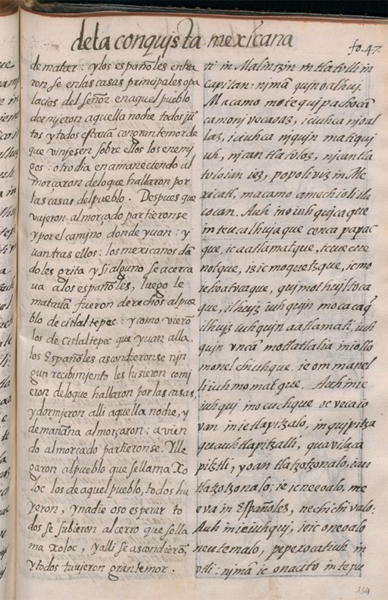 |
[Transcription of the Nahuatl (right-hand column) by James Lockhart:]
[f. 47r.] ti in Malintzin in tlatolli in capitan: nimā quinoalhui. Macamo motequipachocā camo nivecaoaz, iciuhca nioallaz, iciuhca niquinmatiquiuh, nican tlatoloz, nican tlatoloian iez, popoliviz in Mexicatl, macamo amechiolitlacocan.
Auh in o iuh quicaque in teucalhuiaque cenca pacque, ic aatlamatque, ic cuecuenotque, iz* ic mo quetzque, ic moiehoatocaque, quimolhuiltocaque, ilhuiziuhquin mocacaq̄** ilhuiz iuhquin aatlamati, iuhquin vncā motlatlalia iniollo monelchiuhque, ie om ma nelli momatque. Auh inic iuhqui in ocuchque oc veca iovan in ietlapitzalo, in quipitza quauhtlapitzalli, quavilacapitztli, yoan tlatzotzonalo, iautlatzotzonalo:
ie ic neeoalo, meeva in Españoles, nechichivalo: Auh in ie iuhqui, ie ic oneoalo neutemalo, pepexocatiuhin vtli: nimā ic onacito in tepu
----------
*IZ. Perhaps for "ie."
**MOCACAQ̄. I follow Sahagún 1950-1982: 13.76, in translating this construction, which I have not been able to analyze.
|
[Translation of the Nahuatl (right-hand column) by James Lockhart:]
what they said to the Captain, he replied to them, “let them not be concerned, I will not be gone long, I will quickly come back and find my way to them. Here the judgment will take place, here will be the place of judgment. The Mexica will be destroyed, let them not cause you grief.”
And when the people of Teocalhueyacan heard this, they rejoiced greatly; they grew proud and presumptuous because of it, they rose up, thinking themselves preferred and fortunate. Even more than seeming satisfied and proud, they seemed to be consoled, they were convinced, they thought it true. And this to the extent that when [the Spaniards] had gone to sleep, far into the night wind instruments were being played, wooden flutes and wooden fifes, and there was drumming, war drumming.
<While the drumming was still going on> people got up, the Spaniards arose and got outfitted. When this was done, the departure took place; the group formed on the road, and the road was full to overspilling. Then they reached Tepotzotlan.
[Translation of the Spanish (left-hand column) by James Lockhart:]
going to kill them. The Spaniards entered the main residence or palace of the lord in that settlement. They slept all together that night, and all were in great fear that the enemy would fall upon them.
The next day at dawn they breakfasted on what they found in the houses of the settlement. After breakfast they left, and on the road where they were going the Mexica went behind them, shouting at them. If someone drew close to the Spaniards, right away they killed him.
They went straight to the settlement of Citlaltepec, and when the people of Citlaltepec saw that the Spaniards were headed there, they hid themselves and did not receive them at all. They ate what they found around the houses. They slept there that night, and in the morning took breakfast; having breakfasted, they left.
They reached the settlement called Xoloc, and the inhabitants all fled; no one dared await them. They all climbed the hill called Xoloc and hid there. They were all greatly afraid.
|
[Translation of the Nahuatl into Spanish by Fr. Bernardino de Sahagún; transcription of the Spanish (left-hand column) by James Lockhart:]
[f. 47r.] de matar: y los españoles entraronse en las casas principales o palacios del señor en aquel pueblo dormieron aquella noche todos jūtos y todos estauā con gran temor de que viniesen sobre ellos los enemigos:
otro dia en amaneciendo almorçaron de lo que hallaron por las casas del pueblo. Despues que vuieron almorçado partieronse y por el camino donde yuan: yuan tras ellos: los mexicanos dādoles grita y si alguno se acercaua a los españoles, luego le matauā
fueron derechos al pueblo de citlaltepec: y como vierō los de Citlaltepec que yuan alla, los Españoles ascondieronse ningun recibimiento les hizieron comieron de lo que hallaron por las casas, y dormieron alli aquella noche, y de mañana almorçaron: aviendo almorçado partieronse.
Y llegaron al pueblo que se llama Xoloc los de aquel pueblo, todos huyeron, y nadie oso esperar todos se subieron al cerro que se llama xoloc, y alli se ascondierō, y todos tuuieron gran temor.
|
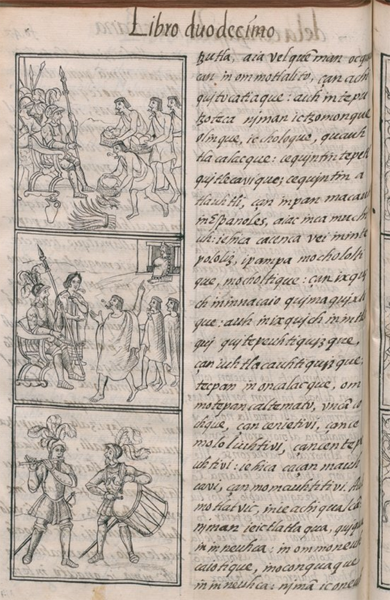 |
[Transcription of the Nahuatl (right-hand column) by James Lockhart:]
[f. 47v.] tzutla, aia vel quēman oc qualcan in ommotlalito, çan achi quitocatiaque: auh in teputzoteca niman ic tzomonque olinque, ic choloque, quauhtla calacque: cequintin tepetl quitlecavique; cequintin atlauhtli, çan inpan macauh in Espanoles, aiacinca muchiuh: iehica ca cenca vei in intepololiz, ipampamochololtique, mocholtique: çan ixquich in innacaio quimaquixtique: auh in ixquich in intlatqui quitepeuhtiquizque, çaniuh tlacauhtiquizque: tecpan in oncalacque, ommotepancaltemato, vncā cochque, çan cenietivi, çan cemololiuhtivi, çan centepeuhtivi: iehica ca çan mauhcavi, çan momauhtitivi.
Auh in otlatvic, in ie achi qualcā: niman ie ic tlatlaqua, quiqua in inneuhca: in ommoneuhcaiotique, in oconquaque in inneuhca: nimā ic oneuh
|
[Translation of the Nahuatl (right-hand column) by James Lockhart:]
It was not yet late, still in good time, when they stopped; they had proceeded only a short distance. Then the people of Tepotzotlan scrambled about, started moving, ran from them and went into the woods. Some climbed up the mountains, some [hid in] ravines. [Everything] was left to the Spaniards. No one attended to them; because of their great destruction of people, they ran off and fled, saving nothing but their bodies. They left all their property scattered about, abandoning things just as they were. [The Spaniards] went into the palace, arranged themselves there and slept there, all together, gathered together, bunched, because they went in fear, frightened.
And when it dawned and the time was opportune, then they ate their breakfast, and when they had breakfasted
[Translation of the Spanish (left-hand column) by James Lockhart:]
(intentionally blank)
|
[Translation of the Nahuatl into Spanish by Fr. Bernardino de Sahagún; transcription of the Spanish (left-hand column) by James Lockhart:]
[f. 47v., tres dibujos; sin texto en español]
|
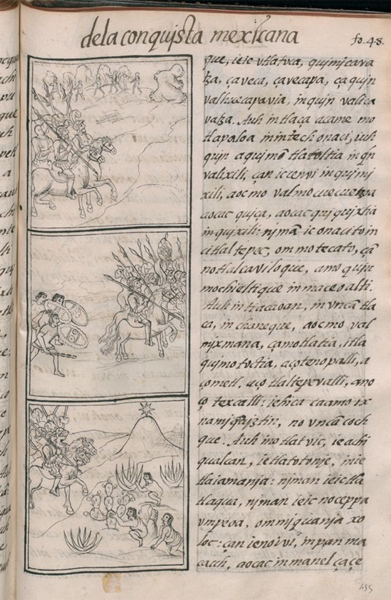 |
[Transcription of the Nahuatl (right-hand column) by James Lockhart:]
[f. 48r.] que, ie icvtlatoca, quimicavatza, ça veca, ça vecapa, ça quinvalhuecapavia, in quinvalicavatza. Auh intla ça acame motlapaloa in intech onaci, iuhquin aquimōtlatoltia in q’nvalixili, çan ic cen vi in quimixili, aocmo valmocuecuetzoa aocac quiça aocac quiquixtia in quixili:
nimā ic onacito in citlaltepec, ommotecato, çāno tlalcaviloque, amo quinmochieltique in maceoalti. Auhin tiacaoan, in vncā tlaca, in chaneque, aocmo valmixmana, ça motlatia, itla quimotoctia, aço tenopalli, açometl, aço tlatepevalli, anoço texcalli: iehica ca amo ixnamiquiztin, no vncā cochque.
Auh in otlatvic, ie achi qualcan, ie tlatotonie, in ie tlaiamania: niman ie ic tlatlaqua, niman ie ic no ceppavmpeoa, ommiquania xoloc: çan ie no ivi, inpan macauh macauh, aocac in manel ça çe
|
[Translation of the Nahuatl (right-hand column) by James Lockhart:]
they departed. As they went on their way,[the Mexica] shouted at them, just coming after them at a distance, shouting at them from afar. But if some of them dared come near them, as though they were going to engage them in talk, [the Spaniards] stabbed them. Those who were stabbed were gone forever. They moved no more; no one came to save those who were stabbed.
Then they got to Citlaltepec and made a halt. Also there things were left abandoned for them; the people did not await them. And the warriors who were from there no longer presented themselves, but hid, taking refuge behind something, a rock cactus, or a maguey, or a mound of earth, or a crag, because [the Spaniards] were irresistible. There too they spent the night.
And when it dawned and the time was opportune, when it was warm and pleasant, they ate; then they got on their way again and moved to Xoloc. In the same way it was left in [the Spaniards’] hands. No one, not a single person,
[Translation of the Spanish (left-hand column) by James Lockhart:]
(intentionally blank)
|
[Translation of the Nahuatl into Spanish by Fr. Bernardino de Sahagún; transcription of the Spanish (left-hand column) by James Lockhart:]
[f. 48r., tres dibujos; sin texto en español]
|
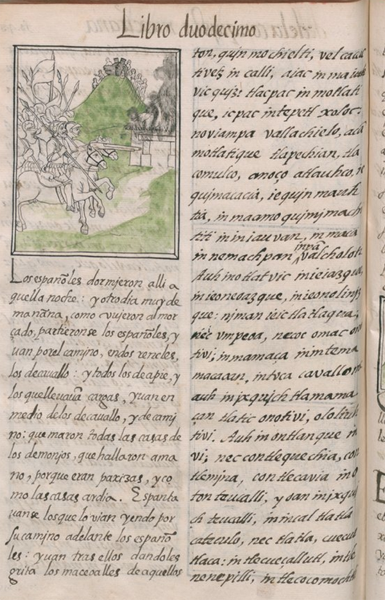 |
[Transcription of the Nahuatl (right-hand column) by James Lockhart:]
[f. 48v.] ton, quinmochielti,vel cacactivetz in calli, aiac in ma ivic quiz: tlacpac inmotlatique, icpac in tepetl xoloc: noviampa vallachielo, acā motlatique tlapechian, tlacomulco, anoço atlauhco,ie quimacacia, ie quinmauhtia, in ma amo quimimachititi in iniauvan, in maca innemachpan inpā valcholoti.
Auh in otlatvic in ie iazque, in ie oneoazque, in ieonolinizque: niman ie ic tlatlaqua; ie ic vmpeoa, necocomac onotivi; in mamaça in intemamacaoan, intoca cavallome: auh in ixquich tlamama çan tlatic onotivi, ololiuhtivi. Auh in ontlanque in vi; nec contlequechia, contlemina, contlecavia in otonteucalli, yoan in ixquichteucalli, in incal tlatlacateculo, nec tlatla, cuecuetlaca: in tlecueçallutl, in tlenenepilli, in tlecocomochtli
|
[Translation of the Nahuatl (right-hand column) by James Lockhart:]
awaited them. The houses were entirely empty; no one at all came out toward them. They hid above, on top of Mount Xoloc, from where one looks out in all directions. They did not hide anywhere on plains, in gullies, or in ravines, apprehensive and afraid lest their enemies spring upon them without warning, unawares.
And when dawn came and they were about to go, make their departure, and break camp, then they ate and got on their way. On both sides of the road came their people-bearing deer, called horses, and all those who bore burdens went gathered together inside [the rows]. And just as they were going they set fire to, ignited and burned the Otomi temple and all the other temples, houses of demons. Then they burned and crackled, there were tongues of flame and smacking sounds;
[Translation of the Spanish (left-hand column) by James Lockhart:]
The Spaniards slept there that night.
The next morning very early, after breakfasting, the Spaniards left. The horsemen went along the road in two files, and all the footmen and those who carried loads went on the road in the middle of the horsemen. They burned all the houses of demons that they found at hand, because they were of thatch, and when the houses started burning, those who saw it were shocked. As the Spaniards went ahead on their way, the macehuales of those places went behind them shouting at them,
|
[Translation of the Nahuatl into Spanish by Fr. Bernardino de Sahagún; transcription of the Spanish (left-hand column) by James Lockhart:]
[f. 48v.] [Un dibujo, y luego:] Los españoles dormieron alli aquella noche:
y otro dia muy de mañana, como vuieron almorçado, partieronse los españoles, yuan por el camino, en dos rencles, los de cauallo: y todos los de a pie, y los que lleuauā cargas, yuan en medio de los de cauallo, y de camino: quemaron todas las casas de los demonios, que hallaron a mano, porque eran paxizas, y como las casas ardia. Espantauanse los que lo vian yendo por su camino adelante los españoles: yuan tras ellos dandoles grita los maceoalles de aquellos
|
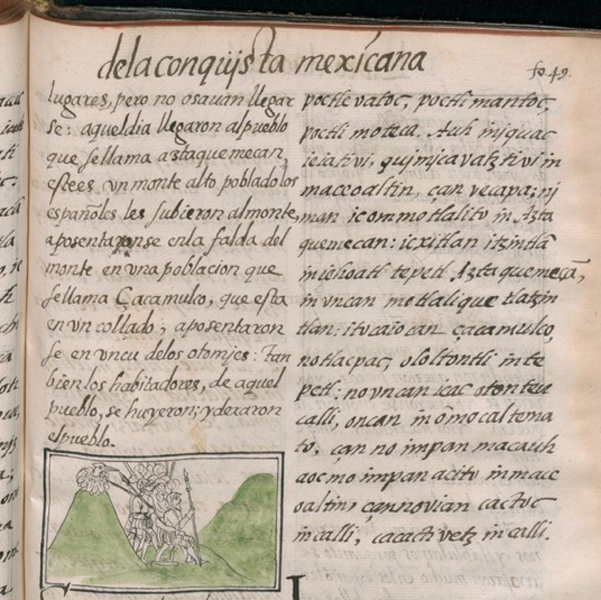 |
[Transcription of the Nahuatl (right-hand column) by James Lockhart:]
[f. 49r.] poctlevatoc, poctli mantoc, poctli moteca. Auh in iquacie iativi, quimicavatztivi in maceoaltin, çan vecapa:
niman ic ommotlalito in Aztaquemecan: icxitlan itzintlā in iehoatl tepetl Aztaquemecā, in vncan motlalique tlatzintlan: itocaiocan çacamulco, no tlacpac, ololtontli in tepetl: no vncan icac otonteucalli, oncan in ōmocaltemato, çanno impan macauh aocmo impan acitoin maceoaltin, çan novian cactoc in calli, cacactivetz in calli.
|
[Translation of the Nahuatl (right-hand column) by James Lockhart:]
smoke rose, hung about, spread out. And as they went off, the people shouted at them, but from afar.
Then they made a halt at Aztaquemecan, at the foot and base of Mount Aztaquemecan. They established themselves there below, at a place called Çacamolco. Also there was a rounded hill above, and an Otomi temple stood there. They set themselves up in the houses there. Likewise the place was left to them, the people no longer came among them; the houses everywhere lay silent and abandoned.
[Translation of the Spanish (left-hand column) by James Lockhart:]
but dared not approach.
That day they reached the settlement called Aztaquemecan, where the people are settled on a high mountain. The Spaniards climbed up the mountain toward them and lodged on its lower slopes in a town called Çacamolco, which is on a hill. They lodged in a cu of the Otomis. The inhabitants of that settlement also fled and abandoned the settlement.
|
[Translation of the Nahuatl into Spanish by Fr. Bernardino de Sahagún; transcription of the Spanish (left-hand column) by James Lockhart:]
[f. 49r.] lugares, pero no osauan llegarse:
aquel dia llegaron al pueblo que se llama aztaquemecan, este es vn monte alto poblado los españoles les subieron al monte, aposentaronse en la falda del monte en vna poblacion que se llama Çacamulco, que esta en vn collado, aposentaronse en vn cu de los otomies: Tanbien los habitadores, de aquel pueblo, su huyeron; y dexaron el pueblo.
|
